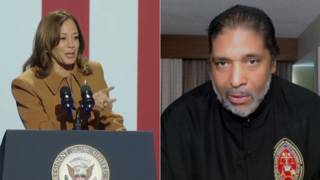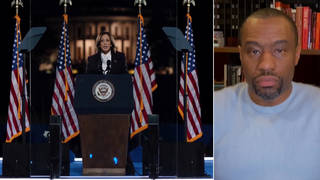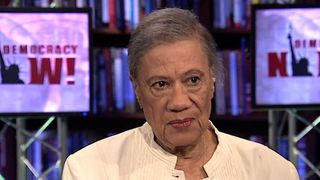
Related
Malcolm X was born 80 years ago today. To commemorate the occasion we hear a speech by Columbia University professor Manning Marable chronicling his life. Marable is currently working on a major new biography of Malcolm X which is tentatively titled, “Malcolm X: A Life of Reinvention.” [includes rush transcript]
Today we are going to spend the hour looking at one of the most dynamic leaders of the 20th century. He was born 80 years ago today but lived only 39 years. I’m talking about Malcolm X. To mark the occasion here in New York, the Shabazz family has temporarily opened the “Malcolm X and Dr. Betty Shabazz Memorial and Educational Center,” which is located in what was once the Audubon Ballroom, where Malcolm X was assassinated on February 21, 1965.
A group of people are making a pilgrimage today to the Ferncliff Cemetery in Hartsdale, New York where Malcolm X is buried >During the program today we are going to journey through parts of Malcolm X’s short but extraordinary life. We’ll play portions of the documentary “Malcolm X: Make it Plain.” But first, we begin with Professor Manning Marable of Columbia University. He is currently working on a major new biography of Malcolm X. Marable has already spent more than a decade researching the book which is tentatively titled “Malcolm X: A Life of Reinvention.” Marable has said “Malcolm X was potentially a new type of world leader, personally drawn up from the wretched of the earth into a political stratosphere of international power.”
Marable’s research has raised new questions about The Autobiography of Malcolm X which was written with Alex Haley. Marable has also examined un-redacted FBI files which provide new insight into the role of FBI and the New York Police Department in the assassination of Malcolm X.
On the 40th anniversary of Malcolm X’s assassination in February, Professor Marable spoke here in New York City.
- Manning Marable, Columbia University professor speaking on February 21, 2005.
Transcript
AMY GOODMAN: Dr. Manning Marable, speaking in February on the anniversary of Malcolm X’s assassination, talked about a number of issues. He has raised in his research for his biography new questions about The Autobiography of Malcolm X, which was written with Alex Haley. Marable has also examined un-redacted F.B.I. files which provide new insight into the role of the F.B.I. and the New York Police Department in the assassination of Malcolm X. On the anniversary of that assassination, Dr. Manning Marable spoke here in New York.
MANNING MARABLE: On the 40th anniversary of the assassination of El-Hajj Malik el-Shabazz, of Malcolm X, if one had to select only one historical personality between the period of 1940 to 1975 who best represented and reflected black urban life, politics, culture and society in the United States, it would be impossible not to choose the charismatic figure of Malcolm X. Born in Omaha, Nebraska, in 1925 and growing up in the Midwest, young Malcolm Little was the child of political activists who supported the militant black nationalism Pan-Africanist movement of Marcus Garvey and the Universal Negro Improvement Association. After his father’s violent death and his mother’s subsequent institutionalization due to mental illness, young Malcolm was placed in foster care and for a time in a youth detention facility.
At the age of 16, he left school, relocating to Boston upon the invitation of his older half-sister, Ella Collins. During the Second World War, the zoot-suited Detroit Red became a small-time hustler, burglar and dealer in Harlem and Roxbury. In January 1946, Malcolm Little was arrested for burglary and weapons possession charges, and he received a 10-year sentence in Massachusetts prisons. While incarcerated, Little’s siblings introduced him to the Nation of Islam, a then tiny black nationalist-oriented religious movement led by the Honorable Elijah Muhammad. Converting to the N.O.I.’s version of Islam, Malcolm experienced a spiritual and intellectual epiphany behind bars.
Emerging from prison in August 1952 as Malcolm X, the talented and articulate young convert was soon the assistant minister of N.O.I.'s Detroit Temple Number One. The actual public career of minister Malcolm X was, like Dr. Martin Luther King, Jr.'s, remarkably tragic and short. In 1954, Malcolm was named minister of Harlem’s Temple Number Seven, which he soon led for a decade. As an itinerant spokesperson for black nationalism in the United States, Brother Malcolm traveled constantly across the country, winning tens of thousands of new converts to the Nation of Islam. Between 1954 and 1963, Malcolm was personally responsible for establishing over 100 Muslim temples or mosques throughout this country as the chief spokesperson for Elijah Muhammad.
Malcolm built the N.O.I. from a marginal sect to a spiritual organization of over 100,000 people. By the early 1960s, Malcolm was widely celebrated and feared as a public speaker and debater at universities and colleges and in the national media. The F.B.I., the Federal Bureau of Investigation, and its efforts to discredit the Nation and its leadership, led the agency to engage in a variety of illegal acts, wiretapping, surveillance, disruption, and harassment. In 1960, Malcolm helped to establish the newspaper, Muhammad Speaks, which by the end of the 1960s would have a national circulation of 600,000, by far the most widely read black-owned newspaper in the United States at that time. However, by the early '60s, serious divisions developed between Malcolm X and the Nation of Islam's leadership, and especially Elijah Muhammad. He also chafed under the N.O.I.’s political conservatism, its refusal to offer support to the growth of civil rights protests throughout the country.
In March 1964, Malcolm announced publicly his break with the N.O.I. He created two new organizations: Muslim Mosque Incorporated, designed for former N.O.I. members, as a spiritually-based organization; and a secular-oriented organization, the O.A.A.U., the Organization of Afro-American Unity. Now reaching out to the Civil Rights Movement, Dr. Martin Luther King, Jr., James Farmer, Bayard Rustin, A. Philip Randolph, Malcolm began to propose a broad coalition of black activist organizations working in concert to achieve racial justice. Converting to traditional Islam, Malcolm completed his spiritual Hajj to Mecca in April 1964 and returned to the United States the next month as El-Hajj Malik el-Shabazz.
During his two extended journeys throughout Africa and the Mid-East during the year 1964, Malcolm gained new insights into the problem of racism, trans-nationally. In his autobiography, he would later write, (quote), “I was no less angry than I had been, but at the same time, the true brotherhood I had seen and had been influenced me to recognize that anger can blind human vision.” He now believed that race was not — a race war in the United States was not inevitable and that America could be, perhaps, (quote), “the first country that can actually have a bloodless revolution.”
Malcolm X’s new political strategy called for building black community empowerment through tools such as voter registration and education, economic self-sufficiency, and the development of an independent African American politics, which blacks themselves controlled and was responsive and responsible fundamentally to the black community. He called upon African Americans to transform the Civil Rights Movement into a struggle for international human rights. Malcolm X emphasized the parallels between the African American struggle for equality and the Asian, Latino and African campaigns against European colonialism and imperialism. Malcolm stressed the issue of class exploitation, especially in the last months of his life. He also drew attention for criticizing the growth of U.S. military engagement and involvement in Southeast Asia, becoming one of the first prominent U.S. leaders to denounce the U.S. war in Vietnam.
Upon Malcolm’s return to the United States in November 1964, death threats escalated against him and his family. In the early morning hours of February 14, 1965, at his home in Queens, his house was firebombed. On Sunday afternoon, February 21, exactly 40 years to the day of today, Malcolm X, El-Hajj Malik el-Shabazz, was assassinated before hundreds of people, including his pregnant wife, Betty Shabazz, and three of their four children.
The profound religious and political sojourn of Malcolm X was hardly noticed by the mainstream press. The New York Times depict one odious example, stated that Malcolm on the — just days after his assassination, was, (quote), “an irresponsible demagogue, an extraordinarily twisted man who had utilized his, [quote], 'true gifts' to evil purposes.”
But there were other points of view that were raised about Malcolm X, including that of President Kwame Nkrumah of Ghana who sent a telegram of condolences to Malcolm’s widow, stating, (quote), “Your husband lived a life of dedication for human equality and dignity so that the African American people and people of color everywhere may live as men. His work in the cause of freedom will not be in vain.”
Long remembered were the words, as well, of the great activist, the great actor, and a great friend, Ossie Davis: “Many will ask what Harlem finds to honor in this stormy, controversial and bold young captain, and we will smile. They will say he is of hate, a fanatic, a racist. And we will answer, 'Did you ever talk to brother Malcolm? Did you ever touch him or have him talk you to? Did you ever really listen to him? Did he ever do a mean thing? Was he ever himself associated with violence or any public disturbance? For if you did, you would know him…Malcolm was our manhood.' This was his meaning to our people, and in honoring him, we honor the best in ourselves. And we will know him then for what he was and is: a prince, our own black shining prince who didn’t hesitate to die because he loved us so.”
AMY GOODMAN: Manning Marable, Columbia University professor speaking on the anniversary of Malcolm X’s assassination in February. Today, is the anniversary of Malcolm X’s birthday.













Media Options